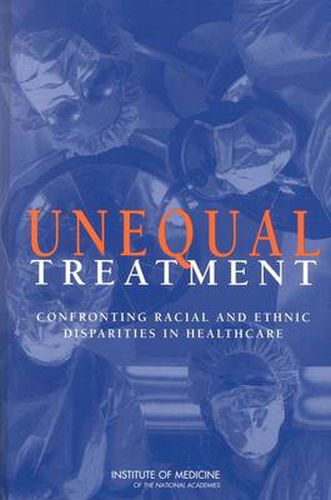Readings Newsletter
Become a Readings Member to make your shopping experience even easier.
Sign in or sign up for free!
You’re not far away from qualifying for FREE standard shipping within Australia
You’ve qualified for FREE standard shipping within Australia
The cart is loading…






Racial and ethnic disparities in health care are known to reflect access to care and other issues that arise from differing socioeconomic conditions. There is, however, increasing evidence that even after such differences are accounted for, race and ethnicity remain significant predictors of the quality of health care received. In Unequal Treatment , a panel of experts documents this evidence and explores how persons of color experience the health care environment. The book examines how disparities in treatment may arise in health care systems and looks at aspects of the clinical encounter that may contribute to such disparities. Patients’ and providers’ attitudes, expectations, and behavior are analyzed. How to intervene? Unequal Treatment offers recommendations for improvements in medical care financing, allocation of care, availability of language translation, community-based care, and other arenas. The committee highlights the potential of cross-cultural education to improve provider-patient communication and offers a detailed look at how to integrate cross-cultural learning within the health professions. The book concludes with recommendations for data collection and research initiatives. Unequal Treatment will be vitally important to health care policymakers, administrators, providers, educators, and students as well as advocates for people of color.
$9.00 standard shipping within Australia
FREE standard shipping within Australia for orders over $100.00
Express & International shipping calculated at checkout
Racial and ethnic disparities in health care are known to reflect access to care and other issues that arise from differing socioeconomic conditions. There is, however, increasing evidence that even after such differences are accounted for, race and ethnicity remain significant predictors of the quality of health care received. In Unequal Treatment , a panel of experts documents this evidence and explores how persons of color experience the health care environment. The book examines how disparities in treatment may arise in health care systems and looks at aspects of the clinical encounter that may contribute to such disparities. Patients’ and providers’ attitudes, expectations, and behavior are analyzed. How to intervene? Unequal Treatment offers recommendations for improvements in medical care financing, allocation of care, availability of language translation, community-based care, and other arenas. The committee highlights the potential of cross-cultural education to improve provider-patient communication and offers a detailed look at how to integrate cross-cultural learning within the health professions. The book concludes with recommendations for data collection and research initiatives. Unequal Treatment will be vitally important to health care policymakers, administrators, providers, educators, and students as well as advocates for people of color.